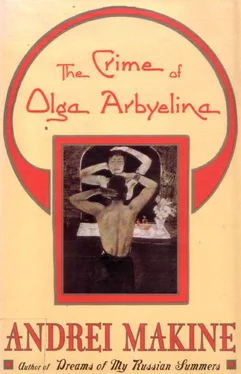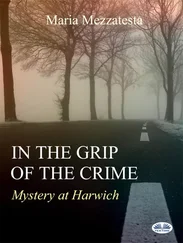At times, in obedience to a sudden command, she stopped and tried to feel dread, terror, to shiver, to let herself be blinded by the monstrousness of what had happened. "It's monstrous, monstrous, monstrous… How? Why? I must die! Run away. Howl, howl, howl!" But this febrile litany rang out inside her as if as a sop to her conscience, without shaking the dull numbness of her mind. She tried to shatter the torpor, to feign, for want of experiencing them, the emotions she should have felt. But there were no emotions! A nameless nothingness…
And alongside this void, an ample and airy silence that reigned all around; the roughness of the bark that her hand touched, leaning against a tree trunk. And the bitter, piquant chill of the snow; and the imperceptibly changing lights on its surface. The pale blue glitter of the snow-clad land; the orange disk of the low sun in the network of the branches. And a woman, herself, who was going to spend these last hours of the day wandering in the snow, stopping from time to time, as now, pressing a hand flat against the bark of a tree, removing one foot from its shoe, her fingers searching for little fragments of ice caught between the leather and the stocking. On the sheet of frozen water the red-haired boy continues with his game. He breaks off when he notices the presence of a stranger-an intruder, an adult. He waits for her to go away. The noisy sliding of the little stones resumes. For a second she believes she can see what the child sees with acute intensity. The dark bottom beneath the ice, with plants and leaves trapped in the crystal of the brown water. Then his gaze is lost for a long time in the branches set on fire by the sunset, and in the sky. A forgetfulness so profound that the stones he has gathered begin to slip from his fingers and fall into the snow one by one…
She held on to the memory of this gaze as she slowly returned home. And it was in a very calm voice that she called out to her son as she opened the door… He was not there. He had come in for lunch, then gone out again. In his absence she sensed an excessive generosity on the part of fate that she must still be wary of. Her mind was aroused, anxious. And almost at once the shoes caught her eye. The ones she had bought him on the black market some months previously, after selling her wedding ring. Quite fine, elegant shoes, despite their worn leather. He dreamed (she knew he sometimes tried them on) of wearing them next spring.
Now this pair of shoes was transformed in her eyes into something indecent, ambiguous… They were arranged near the wall in the position of a short, very lively and agile pace. The agility of a young male who senses that his presence is both alarming and exciting. Olga bent down, struggling against the repugnance that made her fingers shake, and picked up one of them. Then thrust her hand inside it. The reflex action of many years, feeling to check if there was a nail with a point that might cause bleeding…
She did not have time to finish her examination. The shoe escaped from her hands and fell. And at the same moment a cry choked in her throat: "He was inside me!"
And other cries, stifled by the murmuring of the blood in her temples, echoed back: "He was inside my body…" Now she understood why that had remained nameless. For to name it she would not have to speak of emotions but to utter those rough, ugly, uncouth words that came pouring in a glutinous flow into her throat: "He violated me. He had me when he wanted to. He undressed me, took me, dressed me again…"
The horror of these words was such that, panic-stricken, she tried to step back into that afternoon of silence and snow spent under the trees. She half opened the front door. A clear blue dusk was already coloring the meadow that sloped down to the river… No, that afternoon of peace had never existed!
An illusion, a trompe l'oeil of happiness. Now she saw that in reality it had not been a dreamy stroll but a breathless, stumbling race. A mad round amid the dark tree trunks. She had run in circles, trying to escape. Then she had stopped to remove the snow from her shoes and had thought of the peace that death brings. A woman quite other than herself had been born: one who could spend a long time-an eternity-contemplating the low sun entangled in the branches; the slithering of stones cast onto the crystal of frozen water; the eyes of a child lost in the sky…
Yes, it was in thrall to death that she had been able to glimpse the unspeakable happiness of that late afternoon in winter.
As it fell, the black shoe had positioned itself very nimbly beside the other, this time imitating a very small, mincing step. Olga told herself that of all the solutions that had arisen in her shattered mind since that morning-to run away, to explain herself, to say nothing- death was the most tempting, the easiest to accept, and the least real. For every day she must continue carrying out a myriad preventive actions similar to the search for nails lurking inside shoes.
She picked up the one that had fallen to finish examining it… At that moment someone knocked on the door.
Without panic, her heart silent, still, she went to open it, already seeing her son's eyes. She walked along the corridor with a very regular, tense step, as if she were mounting the scaffold.
The appearance on the threshold of the boy with red hair, the little thrower of stones, seemed like a hallucination that must be accepted calmly. From the child's exaggeratedly serious expression it was abundantly clear that he had been sent as a messenger and that he was conscious of the gravity of his mission. He said what he had been asked to say in that mix of Russian phrases and French words common among children born at the Caravanserai. There was a mix-up too, between the seriousness of the circumstance and the nervous smile that stretched his lips. Too overcome, he confused the logical sequence: "Near the bridge… Hospital… Hurt himself… They're asking for you to come…"
She stared at the redhead's mouth as if this mouth had an existence of its own. And her stare ended up by frightening the child. "He didn't even cry!" he shouted and began to run, unable to bear a moment longer the violence with which those eyes were skinning his lips.
By the end of the week she was able to bring her son home. His convalescence was a time of silent reunion. Immobility and pain made him a child again. She felt more a mother than ever.
The night of the first snowfall-that night -formed a vast country of deafness in her mind, that she learned to avoid thinking about and from which only a few sparse fragments came to her. They resembled the strings of air bubbles that are released from time to time by stagnant water. She realized, for example, why that night had taken place on the eve of a Sunday; just like the other one, when she had fallen asleep in the book room. Yes, a Sunday, when an abnormally long sleep could easily take on the appearance of sleeping in… She also recalled that one of the rare games this taciturn child loved to play at the age of seven or eight consisted of ringing the front doorbell and then hiding, to create the mystery of a missing visitor. Within this prank, she told herself, there was an element, no doubt, of that wait for the return of his father, whose "long trip" never came to an end…
These memories disturbed her but they did not last. Any more than the fleeting reflex of revulsion she had on seeing her son's leg, this pale leg from which the plaster had just been removed. The knee and especially the foot were still swollen, and the little row of toes had a childish and strangely equivocal prettiness on this swollen and grayish flesh, on this big man's foot… The doctor palpated the foot with sure and precise gestures, reminiscent of those of a craftsman handling a piece of wood. Dry and far from talkative, he seemed to take a certain delight in the terseness of his own comments, from which there was no appeal. "We shall have to operate to straighten the knee," he explained in a tone designed to avoid all sentimentality. "But we'll do it later, when he's had some rest…" The same evening she reread for the thousandth time the pages especially devoted, as it seemed to her, to this very case, to that very day in the life of her son. Reading these books, she often had the absurd impression that their authors knew her child and could foresee the course of his illness. This illusion was singularly powerful that evening, in the lines that she recited mentally, recognizing them from memory from the shape of the paragraphs:
Читать дальше












